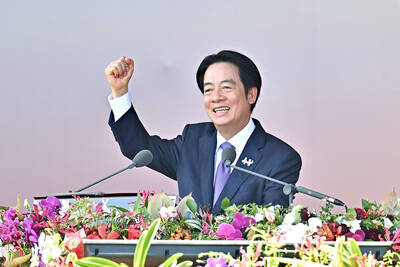The Taipei District Prosecutors’ Office early yesterday morning asked the court to detain former Chinese Nationalist Party (KMT) Central Policy Committee director Alex Tsai (蔡正元) for allegedly embezzling funds from the sale of Central Motion Pictures Corp (CMPC, 中央電影公司).
A hearing was still in progress at press time last night.
Tsai’s wife, Queena Hung (洪菱霙), has been confined to house arrest and prohibited from overseas travel following her release on Monday night on NT$3 million (US$98,782) bail.

Photo: Lin Cheng-kun, Taipei Times
Tsai late last month recused himself from any party position after he announced that he had been appointed chairperson of Jiangsu Min’An Automotive Co (敏安汽車) in China.
Tsai, former CMPC vice president Chuang Wan-chun (莊婉均) and Cheng Uei Precision Industry Co (正崴) chairman Gou Tai-chiang’s (郭台強) wife, Lor Yu-chen (羅玉珍), in 2006 raised NT$3.1 billion and jointly bought out CMPC, prosecutors said.
The shares were initially registered under Apollo Investment Co (阿波羅) — which was founded by Tsai — and were to be transferred to CMPC after accounts were cleared, prosecutors said.

Photo: Lin Cheng-kun, Taipei Times
Tsai allegedly gave Apollo NT$582 million under the guise of a capital reduction by convening an extraordinary shareholders’ meeting as president of Apollo, despite the company being only a nominal shareholder, and Lor being the actual owner of CMPC.
Tsai allegedly signed a contract with himself on behalf of Apollo, entrusting NT$430 million of the capital reduction funds to his name, prosecutors said.
Prosecutors accused Tsai of laundering money from Apollo through different accounts between 2007 and 2009.
A civil case filed by Gou against Apollo and Tsai in 2006 demanding the return of the capital reduction money might have also motivated Tsai to move the money, prosecutors said.
The Supreme Court in May last year upheld a ruling that Tsai must return NT$170 million to CMPC.
The alleged purchase of Chuang’s CMPC promissory note for NT$100 million that was withdrawn from Apollo, and NT$50 million for the alleged purchase of first-buying rights on any CMPC real estate — which CMPC did not agree to — were irregular trading activities that led to the suspicion of embezzlement, prosecutors said.
Tsai’s purchase of Forworld Electronics Co (福彥電子) shares in 2009 using Apollo funds — and then returning the funds in seven installments between 2009 and 2013 — was also suspicious, prosecutors said.
Tsai wired NT$65 million to his wife’s company, Chintsuan Co (金鑽), for investment in real estate in 2012 and 2013, which was not acceptable under the contract signed with his co-purchasers, the office said.
Meanwhile, former KMT chairperson Hung Hsiu-chu (洪秀柱) offered Tsai her support, saying that he was “a principled and honorable man.”
Previous investigations by the former Special Investigation Division (SID) found Tsai innocent, Hung said, adding that she was suspicious of the motives and timing behind the restarted investigation.
The government should not promote political oppression under the guise of a judicial investigation, Hung said.

The Ministry of the Interior (MOI) is to tighten rules for candidates running for public office, requiring them to declare that they do not hold a Chinese household registration or passport, and that they possess no other foreign citizenship. The requirement was set out in a draft amendment to the Enforcement Rules of the Public Officials Election and Recall Act (公職人員選舉罷免法 ) released by the ministry on Thursday. Under the proposal, candidates would need to make the declaration when submitting their registration forms, which would be published in the official election bulletin. The move follows the removal of several elected officials who were

FOUR DESIGNATED AREAS: Notices were issued for live-fire exercises in waters south and northwest of Penghu, northeast of Keelung and west of Kaohsiung, they said The military is planning three major annual exercises across the army, navy and air force this month, with the navy’s “Hai Chiang” (海強, “Sea Strong”) drills running from today through Thursday, the Ministry of National Defense said yesterday. The Hai Chiang exercise, which is to take place in waters surrounding Taiwan, would feature P-3C Orion maritime patrol aircraft and S-70C anti-submarine helicopters, the ministry said, adding that the drills aim to bolster the nation’s offshore defensive capabilities. China has intensified military and psychological pressure against Taiwan, repeatedly sending warplanes and vessels into areas near the nation’s air defense identification zone and across

SENATE RECOMMENDATION: The National Defense Authorization Act encourages the US secretary of defense to invite Taiwan’s navy to participate in the exercises in Hawaii The US Senate on Thursday last week passed the National Defense Authorization Act (NDAA) for Fiscal Year 2026, which strongly encourages the US secretary of defense to invite Taiwan’s naval forces to participate in the Rim of the Pacific (RIMPAC) exercise, as well as allocating military aid of US$1 billion for Taiwan. The bill, which authorizes appropriations for the military activities of the US Department of Defense, military construction and other purposes, passed with 77 votes in support and 20 against. While the NDAA authorizes about US$925 billion of defense spending, the Central News Agency yesterday reported that an aide of US

NATIONAL DAY: The ‘Taiwan Dome’ would form the centerpiece of new efforts to bolster air defense and be modeled after Israel’s ‘Iron Dome,’ sources said President William Lai (賴清德) yesterday pledged to strengthen the nation’s air defense capabilities and build a “T-Dome” system to create a safety net against growing military threats from China. “We will accelerate our building of the T-Dome, establish a rigorous air defense system in Taiwan with multi-layered defense, high-level detection and effective interception, and weave a safety net for Taiwan to protect the lives and property of citizens,” he said in his National Day address. In his keynote address marking the Republic of China’s (ROC) 114th anniversary, Lai said the lessons of World War II have taught nations worldwide “to ensure that